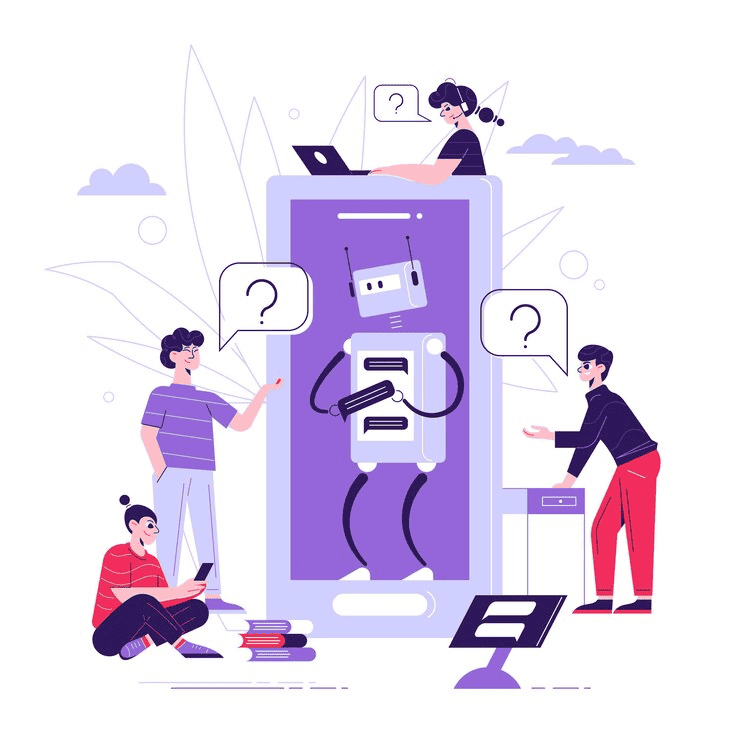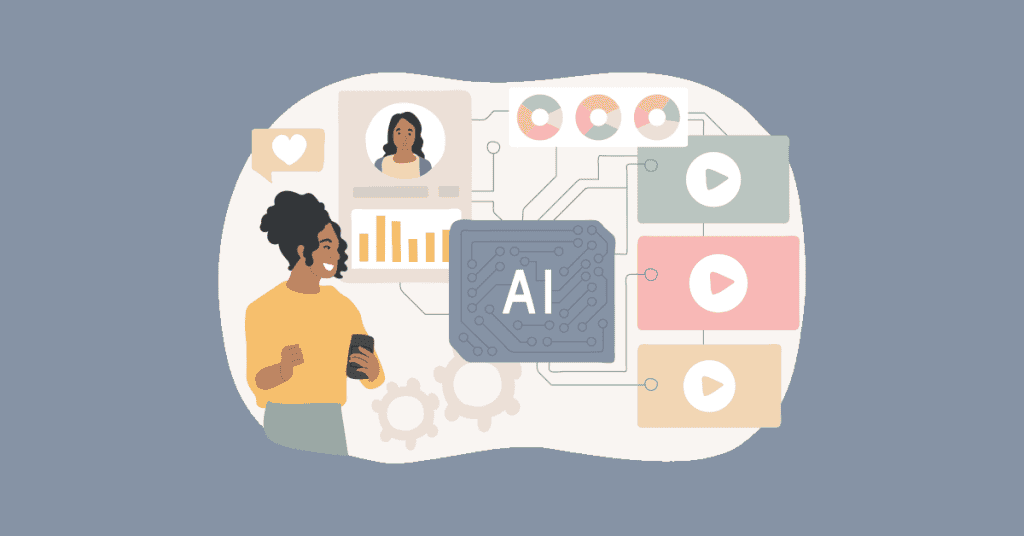Over the past few years, Artificial Intelligence (AI) has blatantly weaved its roots deep into the social media ecosystem; from personalized recommendations to completely AI-generated content, people are consuming, creating, and interacting with information in all new ways with the use of such technology. What’s interesting is that all the changes rapidly produced more concerns regarding the ethical implications of the same in social media. Which kind of blog am I supposed to be reading? One such can focus on the different aspects: Misinformation, bias, privacy, and human agency playing a crucial role in the production of AI-developed content for use on social media.

The Rise of AI in Social Media
AI technologies have penetrated and dominated the virtual world, as they are used in numerous popular platforms like Facebook, Instagram, Twitter, and TikTok. For marketers seeking guidance, a digital marketing mentor can provide insights on how to ethically and effectively leverage these AI-driven tools. Here are some typical applications:
- Content Personalization: Applying AI algorithms does not only sort out and recommend what posts and ads one must see, but also helps analyze user behavior to understand the kind of posts or ads that should appear in an account feed. In addition to social media, website design uses AI to personalize user experiences by predicting and implementing layout and content preferences based on user behavior.
- Chatbots: An AI-controlled chatbot, mainly for customer service and marketing, and customer retention, approaches customers to provide immediate responses to them.
- AI: This provides AI writing tools and other AI-tools to generate content, including text, posts, pictures, and movies, using AI such as ChatGPT and DALL-E, for added creativity without needing technical expertise.
- Moderations: AI gets rid of excess threatening stuff like hate speech, nude content, and fake info so that everything stays safe when online.
The above-mentioned applications have far more potent capabilities because they enrich user engagements and operational efficiencies. However, they also possess many significant ethical challenges. If left improperly maintained or used for other purposes than its original ones, these technologies can affect society and individual cultures very deeply. This is particularly relevant in the case of ai marketing campaigns, where misuse could amplify ethical concerns on a larger scale.
Ethical Concerns in AI-Generated Content
Here are some Ethical Concerns in AI Generated Content:
Misinformation and Disinformation
Such AI-generated content can spread wide misinformation, as well as intentionally or unintentionally. AI video analysis tools offer deep insights into user behavior, helping social media platforms identify and mitigate harmful or misleading content. It is a technology that creates very realistic videos where it won’t be possible to distinguish between what is true and what is not. Consequently, a lot of fake news, generated by AI, circulates much faster across the different social media marketing platforms.
Effects:
- Manipulation of Public Opinion: Misinformation using AI can affect elections, public health decisions and societal beliefs. Using AI tools like Pario and Aitechfy allows you to create a massive amount of content in a short amount of time. This content can be used for disseminating real information or fake news. For example, in the recent-before times during the COVID-19 pandemic, tools with AI utilization were employed in propagating inaccurate information about vaccines, which resulted in vaccine hesitancy.
- Erosion of Trust: Proliferation of fake content in various forms on social media may have a bearing on trust built in such platforms, online business and other legal sources of information. It systematically makes users question every online information, regardless of its authenticity.
Mitigation Strategies:
- AI should be transparent: AI should clearly mark all content as originating through AI or through an AI-generated process, as opposed to content originating through human activity.
- Content checks: Full-proof the validity checks with AI-aided determination along with human efforts to prevent and mitigate misinformation before it spreads.
Bias in AI Algorithms
Artificial intelligence systems are only good at learning historical data. This data, though, is biased and, when it gets embedded in algorithms, perpetuates and magnifies the current inequalities. Use AI-powered interview insights to analyze behavior, trends, and patterns for ethical implementation in social media hiring processes. In social media, all the portions of visibility and reach would depend on the algorithms.
Example:
- Racial Bias-Geo Abstraction: Facial recognition systems have been criticized for higher error rates with minorities, which, in the real world, could create skewed patterns of content moderation and user identification.
- Gender Stereotypes-Implicit Socialization: The recommendations of AI in jobs and consumed contents might adhere by gendering, thereby obviating unusual exposure to potentials and perspectives.
Varieties of remedies
- Broad Training Data: Inclusive and very diverse datasets can then be treated while preparing AI models, which in turn will reflect different age groups, different cultural aspects, as well as diverse perspectives. This can be done using a data curation tool.
- Bias audits: Ensure regular evaluation of bias as well as unintended consequences, both from within and form outside teams.
Privacy Violations
Social media AI often largely depends on proper collection of data for its proper functioning, which means a lot of data could be under suspicion. This kind of data-driven modeling whole offers critical problems relating to privacy since in many cases, users would not be aware of the ways and means with which their collected data gets used or shared.
Threats:
- Surveillance Capitalism: In the language of Shoshana Zuboff, it implies the transformation of user data to goods that are often directed, sometimes without explicit permission, for advertising. These environments constantly transform users into products instead of customers.
- Data Breach: A kind of theft from the digital world that involves cyber hacking of people’s identities or even six pockets, causing emotional distress or a semblance of deprivation.
Suggestions:
- Muting your data: Collect only those data necessary for the intended purpose. Intrusive data collection practices need to be avoided, as they infringe the rights of individuals.
- User Power: Users should be able to control their data more productively through clear setting options and available procedures for opting-out.
Loss of Human Agency
The lack of autonomy on the part of users may condition what they see, who they might interact with. The abstract of some algorithms is to increase user engagement to the exclusion of user independence and that’s thinking that promotes the freedom of each individual.
Problems:
- Filter Bubbles: Such stereotypes create echo chambers by depending on the retrieval of specific content in line with a person’s choices or conceptions, narrowing the field of information that surrounding views can give it access to.
- Little Deliberate Creativity: AI might disallow the active human senses obstructing creative content that is invaluable to human creation in depth and originality purposes.
Risk Response:
- Algorithmic Breatheostat: Assign recommendation items with diverse randomness such that it is broken, so, therefore, one cannot always be shielded in echo bubbles. It makes it possible for users to see all of the people who think differently from them.
- Melding Man and Machine: Tools should be encouraged to augment humans’ creativity rather than replacing it with a more robotic surrogate. AI would, for example, come up with a draft of an idea or possibly start putting things together, but the creative process would stay human.
The Ethical Role of Social Media Companies
All social media platforms have a great role in managing AI ethically and must be able to balance between innovating methods without breaking the ethical criteria.
Transparency: Building Trust Through Clarity
The social media company needs to put a significant focus on transparency to help understand and realize when and in what way artificial intelligence (AI) can get used. To easily distinguish the machine-generated from human-created posts, images, or videos, facilities should mark AI-generated content creation tool clearly. Basically, these AI Labels contribute greatly to building people’s trust and asserting arguments about misinformation.
Besides, ready-to-understand descriptions about their algorithms should be provided. This will lead to an understanding of their experience of seeing various content (i.e., personalized recommendations, trendy topics) and will help them make the best decisions for themselves in their digital interactions.
Accountability: Ensuring Responsibility in AI Usage
Ethical implementation of AI requires accountability. Organizations using AI need to be accountable in the implementation of AI systems in social media that impact on ethical domains. Engagement with third-party organizations often implies audits of the AI technology they use to ensure it is always in line with existing fair standards. Regular reviews and certificates were also part of building transparent and credible systems.
Moreover, platforms were compelled to adapt to the legal frameworks, such as GDPR and CCPA. Regular compliance checks and updates ensured compliance with evolving laws and the avoidance of ethical lapses among the possible consequences.
Ethical AI Development: Prioritizing Responsible Innovation
AI should consider ethics research before creating and developing systems. This could be possible through the formation of dedicated ethics committees of their own organizations. They will develop standards that will be used in developing AI, identify ethical issues about the intention to use AI, and make recommendations to pre-empt those issues before the new technology can be deployed.
Public involvement is yet another vital attribute of ethical development of AI. AI devlopment Companies can tap into the wealth of these resources through involving users in open dialogue about the ethics of AI, which brings about new learning possibilities and establishes a culture of honesty and responsibility. Another benefit is the guaranteed nature of further evolution of AI technologies with so much regard for society’s values and expectations.
The arrangement of a delicate equilibrium between qualities like scalability and responsibility ultimately yields the wider purpose of promoting trust and security of the information resource environment within an organization.
Regulatory and Policy Challenges
The regulatory authorities and governments must provide solutions to the moral challenges presented by AI on social media; however, this is operationally complex when attempting to define good strategies.
Key Challenges:
- Cross-border Governance: Since the activity is multi-boundary, forming some type of world governance has to be created. For if we didn’t, discrepancies or blind spots optimization become more probable through obsolete regulations.
- Quick-evolving Technology: Artificial intelligence changes event-outpaces the regulatory framework, making it potentially difficult to catch up on the advancement of various technologies that it takes to determine potential future or current gaps.
- Creating a Balance: Innovations and Regulations: Under regulation promotes legitimized unethical acts. Overregulation, on the other hand, paralyzes technology growth.
Policy Recommendations:
- Standardized Laws: Writing global standards for moralistic AI and ensuring uniformity across platforms/groups and within regions.
- Flex Policies: Keeping laws, which can be updated and refashioned with every single change in technology, so that there can be no limitation on innovations-these actions will neither harm the morale nor discourage other technological aspects.
- Public-Private Partners: Partnerships between universities, industry, and governments for understanding deliberate narratives in emerging technologies and collaborating around a framework; it comes under internationalism and a global set of beliefs.
The Role of Users
If we speak of moral AI design, then every user has a role to play on social media; awareness, activism drive change and place pressure. The following are some steps to be taken by users:
- Get the Facts: Understand how AI impacts everything from recommendation systems to AI generated posts on social media.
- Check Facts: Fact check posts before sharing them, especially if they seem sensational or are one-sided in argument.
- Report Abuse: Flag inappropriate or injurious AI-generated content for a site to notice and address.
- Advocate for Ethics: Align with organizations and movements that promote ethics in AI and demand transparency from platforms.
The Future of AI Ethics in Social Media
Artificial intelligence will always evolve, new ethical dilemmas are bound to crop up in the scenario of how AI will play a great role in the ethical future of social media. Here are several things that are predicted for an enhanced future that will rise in terms of ethical AI in social media:
- More Transparent AI: Newly evolved technologies such as “XAI” will make algorithms much easier to understand. For instance, users should know why they received the particular content recommendation or news. This will surely foster understanding.
- Stronger Ethical Standards: Establishing global norms, just as made by UNESCO’s recommendation on AI ethics means, may be taken to guide the future. Thus, these standards will probably have the potential to bind various platforms around the world.
- More Collaboration: Collaboration among tech industries, governments, and civil society is the answer to solving very thorny ethical dilemmas. By this collaborative effort, a great deal of innovation can be encouraged to provide solutions, balancing ethics with innovation.
Final Thoughts on the Ethics of AI Content on Social Media
AI-conformed social media introduces a broad range of opportunities as well as several actual and prospective ethical challenges. Misinformation, bias, privacy violation, and human agency have been sedated under their far-reaching concerns that should come out of their clinical circumstances. The resolution of these issues calls for tri-level domain responsive measures between social media platforms, policy elements, and users themselves.
Ethical AI in social media is not only about mitigating risks; it is designed to create such a digital environment where the value system is based on trust, fairness, and inclusivity. Given the greater emphasis on ethical principles, they will be an important source of power of AI in informing, connecting, and promoting a more even digital world.


